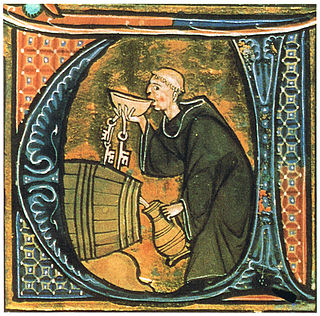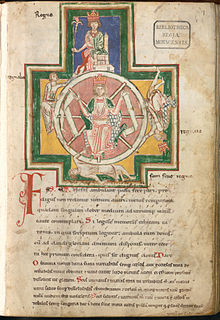Related Research Articles

The Archpoet, or Archipoeta, is the name given to an anonymous 12th-century author of ten medieval Latin poems, the most famous being his "Confession" found in the Carmina Burana manuscript. Along with Hugh Primas of Orléans, he is cited as the best exemplar of Goliardic poetry and one of the stellar poets of the Latin Middle Ages.

The goliards were a group of clergy, generally young, in Europe who wrote satirical Latin poetry in the 12th and 13th centuries of the Middle Ages. They were chiefly clerics who served at or had studied at the universities of France, Germany, Spain, Italy, and England, who protested against the growing contradictions within the church through song, poetry and performance. Disaffected and not called to the religious life, they often presented such protests within a structured setting associated with carnival, such as the Feast of Fools, or church liturgy.

Medieval literature is a broad subject, encompassing essentially all written works available in Europe and beyond during the Middle Ages. The literature of this time was composed of religious writings as well as secular works. Just as in modern literature, it is a complex and rich field of study, from the utterly sacred to the exuberantly profane, touching all points in-between. Works of literature are often grouped by place of origin, language, and genre.
Aurelius Prudentius Clemens was a Roman Christian poet, born in the Roman province of Tarraconensis in 348. He probably died in the Iberian Peninsula some time after 405, possibly around 413. The place of his birth is uncertain, but it may have been Caesaraugusta (Saragossa), Tarraco (Tarragona), or Calagurris (Calahorra).
Henry d'Andeli was a 13th-century Norman poet notable for his work La Bataille des Vins, and for the satirical poem Battle of the Seven Arts. He also wrote Dit du Chancelier Philippe on the subject of his contemporary Philip the Chancellor.

Elaine Feinstein was an English poet, novelist, short-story writer, playwright, biographer and translator. A recent critic commented: "Alive to her family origins in the Russian-Jewish diaspora, she developed a close affinity with the Russian poets of this and the last century."
Helen Jane Waddell was an Irish poet, translator and playwright. She was a recipient of the Benson Medal.
Matthew of Vendôme was a French author of the 12th century, writing in Latin, who had been was a pupil of Bernard Silvestris, at Tours, as he himself writes.

Galit Hasan-Rokem is the Max and Margarethe Grunwald professor of folklore at the Mandel Institute of Jewish Studies at the Hebrew University of Jerusalem. Author and editor of numerous works, including co-editor of the Wiley-Blackwell Companion to Folklore (2012), her research interests include proverbs, folklore and culture of the Middle East, and folklore genres and narratives. She is also a published poet and translator of poetry, and a Pro-Palestinian activist. The Jerusalem Post has called her "a figure of some prominence in Jerusalem intellectual circles".
Ann Buckley is an Irish musicologist, born in Dublin.
Maximianus or Maximian was a Latin elegiac poet of the 6th century, who has been called "in some sort, the last of the Roman poets".

The Cambridge Songs are a collection of Goliardic medieval Latin poems found on ten leaves of the Codex Cantabrigiensis, now at the Cambridge University Library. The songs as they survive are copies made shortly before or after the Norman Conquest (1066). They may have been collected by an English scholar while travelling on the continent sometime after the last datable song (1039), and brought back with him to the church of Saint Augustine at Canterbury, where they were copied and where the Codex was long kept. The original manuscript was possibly lost in a fire that struck Saint Augustine's in 1168. The dialect of the few vernacular portions found in some of the songs is in the North Rheno-Franconian dialect of Old High German, suggesting that the Goliard or Goliards who composed them came from the north or middle Rhineland, probably the area between Trier, Cologne, and Xanten. It has been suggested that some of the songs originated in France or Italy. While most of the Cambridge Songs survive only in the Cambridge manuscript, a few are duplicated in a manuscript, W, from Wolfenbüttel.

That part of the United Kingdom called Northern Ireland was created in 1922, with the partition of the island of Ireland. The majority of the population of Northern Ireland wanted to remain within the United Kingdom. Most of these were the Protestant descendants of colonists from Great Britain.
Eleanor Shipley Duckett was an English-born philologist and medieval historian who spent most of her career in the United States. For thirty years, she taught at Smith College. Duckett published a number of books with University of Michigan Press, mainly on European history, religious history, and saints, and was a reviewer for The New York Times Book Review. Initially, Duckett was known for writing accessible historical books on the Middle Ages; later, she acquired a reputation as an authority on early medieval saints. A devout Episcopalian, Duckett was the lifelong companion of novelist Mary Ellen Chase.

Clerici vagantes or vagabundi is a medieval Latin term meaning "wandering clergy" applied in early canon law to those clergy who led a wandering life either because they had no benefice or because they had deserted the church to which they had been attached.

Drinkers Masses, to include Gamblers Masses, was a genre of medieval Latin poetry which parodied the Roman Catholic Latin Mass in order to make fun of drinking and gambling monks and clerics. These masses were written between about 1100 to 1700 by clerici vagantes, with the first example being the gamblers mass, found in the Carmina Burana. The genre is somewhat related to other medieval ecclesiastic parody, such as the Feast of Fools and the Feast of the Ass.
Barbara Jane Newman is an American medievalist, literary critic, religious historian, and author. She is Professor of English and Religion, and John Evans Professor of Latin, at Northwestern University. Newman was elected in 2017 to the American Philosophical Society.
Joan Cadden is Professor Emerita of medieval history and literature in the History Department of the University of California, Davis. She served as President of the History of Science Society (HSS) from 2006-2007. She has written extensively on gender and sexuality in medieval science and medicine. Her book Meanings of Sex Difference in the Middle Age: Medicine, Science, and Culture (1993) received the Pfizer Prize in 1994, from the History of Science Society, as the outstanding book on the history of science.
Jane Chance, also known as Jane Chance Nitzsche, is an American scholar specializing in medieval English literature, gender studies, and J. R. R. Tolkien. She spent most of her career at Rice University, where since her retirement she has been the Andrew W. Mellon Distinguished Professor Emerita in English.
Maude Clarke was an Irish historian.
References
- 1 2 Felicitas Corrigan, Helen Waddell: a Biography (Gollancz, 1986), p. 234-5
- ↑ Kate Macdonald (30 September 2015). Reassessing John Buchan: Beyond the Thirty Nine Steps. Routledge. p. 21. ISBN 978-1-317-30340-4.
- ↑ Fitzgerald, Jennifer (2000). "'Jazzing the Middle Ages': The Feminist Genesis of Helen Waddell's The Wandering Scholars". Irish Studies Review. 8: 5–22. doi:10.1080/09670880050005075.